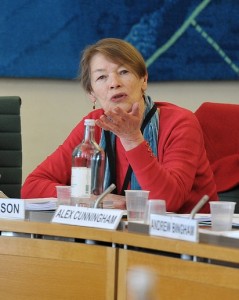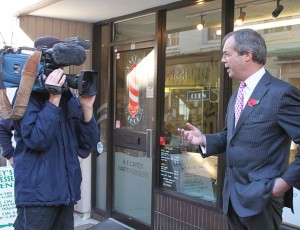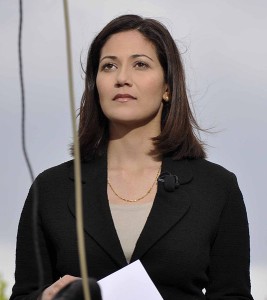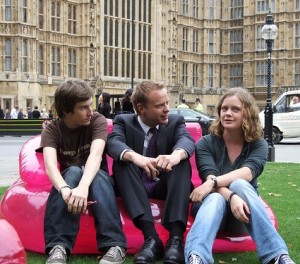100 things we learned about democracy in 2013: Part one
To mark the end of 2013, Democratic Audit has collected 100 of the most important, surprising and downright disturbing things we have learned about democracy this year. Here is part one of our list, ranging from toddlers and tweeting MPs to workplace democracy and the lonely Wigan Tory.
1. Europe-wide voter turnout at the 2014 European elections is likely to be the lowest ever. Find out more here.
2. MPs with slim parliamentary majorities are more likely to be on Twitter than those in safe seats. Find out more here.

Labour MP Glenda Jackson has 6,565 Twitter followers, and a parliamentary majority of 42.
3. Internal party cultures are more important than electoral systems in determining how many women are elected to legislatures. Find out more here.
4. There are no books designed to educate toddlers about democracy… but there will be one published soon. Find out more here.
5. Despite being praised as a model of workplace democracy, managers of the John Lewis Partnership have recently tried to reduce the voting rights of company employees. Find out more here.
6. UKIP representatives have appeared on the BBC’s Question Time 21 times since 2009 – more frequently than any other minor party – although the British National Party is still discussed much more in academic literature. Find out more here and here.
7. Although defeats in parliamentary votes are rare, UK governments are regularly forced to bow to the will of MPs and peers. Find out more here.
8. Whitehall’s prevailing model of ministerial accountability, based on the Haldane principle, is increasingly close to breaking point. Find out more here.

Nigel Farage MEP and other UKIP representatives have achieved media coverage disproportionate with the size of the party.
9. In Welsh local government, only 23% of council chief executives and 5% of council leaders are women. Find out more here.
10. 61% of European Union member states allow expatriate citizens to vote in national elections using overseas embassies. The UK is not one of them. Find out more here.
11. Since 2010 the opportunities for corruption in local government have increased. Find out more here.
12. The British political system is characterised by ‘vanity, duplicity, greed, hypocrisy and cruelty’, according to Gordon Brown’s former spin doctor (who should know). Find out more here.
13. If a proportional representation voting system were introduced for local elections, the number of Conservative councillors in Wigan would increase by 1000%. Find out more here.

On Radio 4’s Today programme, opinion from the City dominated coverage of the financial crisis.
14. Cultural reasons, not technological flaws, are the main reason we have not adopted electronic voting systems in UK elections. Find out more here.
15. Increased polarization in politics significantly reduces voter turnout. Find out more here.
16. MPs who worked in politics before being elected to parliament are more likely to have jobs on their party’s frontbench. Find out more here.
17. The BBC is politically biased… to the right. Find out more here.
18. It is possible to crowdsource a constitution, even if Icelandic politicians don’t agree. Find out more here and here.
19. Voters punish politicians for misinformation that portrays themselves in a favourable light, but not for inaccurate information that attacks their opponents. Find out more here.
20. The questioning style of parliamentary select committees is becoming increasingly aggressive. Find out more here.
21. The former Cabinet Secretary thinks pre-qualification criteria for parliamentary candidates might be a good idea. Find out more here.

Liberal Democrat MP Stephen Gilbert, enjoying a well-earned rest after saving a woman from drowning.
22. The UK provides more than £100 million per year to political parties, including benefits in kind. Find out more here.
23. 66% of English people want to change the constitutional status of England, but only 18% support an English Parliament. Find out more here.
24. Taking into account pre-parliamentary activity, the leaders of the three main parties today are the most politically experienced since 1945. Find out more here.
25. Politicians can save lives. Find out more here.
—
We will be publishing the next instalment of 100 things we learned about democracy in 2013 on Democratic Audit tomorrow. View the full series so far here.
Note: This post represents the views of the authors and does not give the position of Democratic Audit or the LSE. Please read our comments policy before commenting. Shortlink for this post: buff.ly/1jMMRnW
—
Images:
Glenda Jackson – Catherine Bebbington/Parliamentary copyright, CC BY-NC-ND 2.0
Nigel Farage – Stephen West, CC BY 2.0
Mishal Husain – Willstar, CC BY-SA 3.0
Stephen Gilbert – UK Youth Climate Coalition, CC BY-NC-SA 2.0





 Democratic Audit's core funding is provided by the Joseph Rowntree Charitable Trust. Additional funding is provided by the London School of Economics.
Democratic Audit's core funding is provided by the Joseph Rowntree Charitable Trust. Additional funding is provided by the London School of Economics.
What red trousers mean for good governance, and 99 other political nuggets from @democraticaudit https://t.co/nJ3PEUKEHO
Via @Purna_Sen 350 constituencies have never elected female MPs #FabFacts https://t.co/xsY6b7wVl8 @KatieJWhite @JudithCummins @beckycharlwood
RT @Bob__Hudson: Political Finding 19: the BBC is politically biased – to the right! Check it out from @democraticaudit https://t.co/6XYq8WR…
RT @Purna_Sen: 350 Parliamentary constituencies have never elected a female MP @democraticaudit https://t.co/r6zGKRcYJ7
#democracy #women
RT @Bob__Hudson: Interested in British politics? If so you can’t afford to be without this great stuff from @democraticaudit https://t.co/6X…
Bringing in the new year, see fascinating list of 100 things we learned about democracy in 2013 from @democraticaudit https://t.co/Qpwgzoe75E
A late Xmas pressie for my Tory followers: under PR the number of Con councillors in Wigan wld increase by 1000%” https://t.co/idBgCy1TwY
Great compendium of democratic info from @democraticaudit https://t.co/kUbMBXZL7X
A good roundup of 2013 from Democratic Audit: https://t.co/H09FslqQSU
RT @PJDunleavy: Brilliantly informative list from Democratic Audit – a hundred things we learned about UK democracy in 2013: Part one http:…
100 insights into UK democracy in 2013 by @democraticaudit Part 1 https://t.co/Py68MZGb3G and Part 2 via @PJDunleavy https://t.co/Vl0HZOYpRH
https://t.co/29LXt5109p apparently MPs with slim majorities are more likely to be on Twitter than those in safe seats #funfact
RT @democraticaudit: 100 things we learned about democracy in 2013, number 2: MPs with slim majorities tweet the most (via @JamesDonald91) …
Apparently politicians can save lives. I wonder who that could be referring to…
https://t.co/BGqYla0Z9l
Lessons on democracy no. 1-25 https://t.co/ky3u36d0aY
RT @democraticaudit: 100 things we learned about democracy in 2013: Part one https://t.co/KMK915UvsS